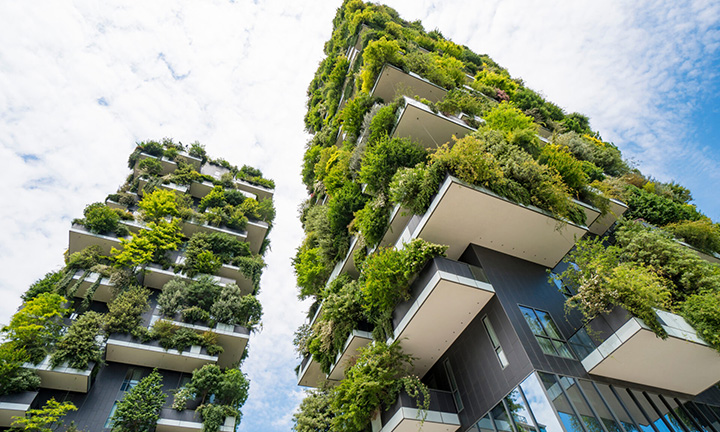|
The Master of Science in Sustainability and Environmental Engineering (MSc SEE) is a graduate programme that provides students with advanced knowledge and skills in the fields of environmental science, engineering and sustainable resource management practices.
This programme is designed to train professionals who can develop and implement sustainable engineering solutions to address global environmental challenges. It covers a wide range of topics including water and wastewater treatment, desalination and reclamation, air pollution control, energy management, waste management, resource recovery, circular economy, coastal protection, flood management, and sustainability.
This programme will prepare graduates with skillsets to meet the growing job markets in the sustainability domain in Singapore and globally; graduates of the programme are well-prepared for careers in various sectors, including industry, government, consulting, and non-profit organizations, where they can work as environmental engineers and managers, sustainability consultants, and policy analysts.
Programme Structure & Duration
Programme Structure
- The programme is available in both full-time study and part-time study.
- Students must complete 30 AUs (10 Courses), of which 18 AUs must be from the Sustainability and Environmental Engineering curriculum core courses.
- To complete requirement of 30 AUs, students may additionally take 12 AUs within CEE courses or maximum of 6 AUs from cross programme list (No. 12 to 16) or maximum of 3 AUs from cross programme list (No. 17 to 21) to satisfy the graduation requirements as well as for knowledge widening.
- Eligible students may choose to select Coursework + Dissertation study track from their 2nd semester onwards (eligibility terms apply)
- Note that a dissertation project is in lieu of 2 courses.
Lesson & Examination Schedule
- There are two semesters each year. You may refer to the academic calendar here for more information.
- Classes are conducted on weekday evenings between 6.30 PM – 9.30 PM, Saturday 9.30 am to 12.30 pm and 2.00 pm to 5.00 pm, unless otherwise informed by your lecturer or indicated in the timetable system. This applies for both full-time and part-time students.
- Note that examinations are generally scheduled on weekday mornings or afternoons, unless otherwise indicated in the timetable system.
Candidature Period
| Courses allowed per semester | Normal / Minimum Candidature Period | Maximum Candidature Period | |
|---|---|---|---|
| Full-time Study | Up to 5 courses (15 AUs) | 1 year (2 semesters) | 3 years (6 semesters) |
| Part-time Study | Up to 3 courses (9 AUs) | 2 years (4 semesters) | 4 years (8 semesters) |
Curriculum
Core Courses
| No | Course Code | Course Title | AUs |
|---|---|---|---|
| 1. | CV6610 | Water Reclamation | 3 |
| 2. | CV6611 | Membrane Technology | 3 |
| 3. | CV6612 | Air Pollution and Modelling | 3 |
| 4. | CV6613 | Sustainable Solid Wastes Management | 3 |
| 5. | CV6614 | Sustainable Energy Management | 3 |
| 6. | CV6615 | Data Science and Environmental Engineering | 3 |
Electives
| No. | Course Code | Course Title | AUs |
|---|---|---|---|
| 7. | CV6616 | Water Resources Engineering & Flood Management | 3 |
| 8. | CV6617 | Seawater Desalination | 3 |
| 9. | CV6481 | Urban and Regional Transport Planning1 | 3 |
| 10. | CV6218 | Value Engineering & Managing Quality2 | 3 |
| 11. | MT6401 | Environmental Shipping3 | 3 |
| Cross Programme (can take up to maximum of 6 AUs) — NBS & ASE | |||
| 12. | BM6603 | Climate Science, Climate Risk Assessment and Sustainable Finance4 | 3 |
| 13. | BM6609 | Sustainable Sourcing and Procurement4 | 3 |
| 14. | ES6006 | Environmental Sustainability5 | 3 |
| 15. | ES6013 | Climate and Climate Change5 | 3 |
| 16. | ES6005 | Environemntal Earth System Science5 | 3 |
| Cross Programme (can take up to maximum of 3 AUs) — PaCE | |||
| 17. | CEL010 | Corporate Sustainability: Sustainable Operations6 | 1.5 |
| 18. | CEL011 | Carbon Neutrality-Solving the Energy Puzzle6 | 3 |
| 19. | CEL012 | Electrification & Waste Heat Recovery6 | 1.5 |
| 20. | CEL013 | Sustainable Water & Waste Management6 | 3 |
| 21. | CEL014 | Circular Economy-Enabling a Sustainable Future6 | 3 |
| Please note that course offerings are subject to review and changes each academic year. | |||
1 Elective offered by CEE - MSc in Civil Engineering 2 Elective offered by CEE - MSc in International Construction Management 3 Elective offered by CEE - MSc in Maritime Studies 4 Elective offered by NBS in MBA (The availability of electives is subject to Nanyang Business School’s discretion each academic year)
5 Elective offered by ASE (The availability of electives is subject to The Asian School of the Environment’s discretion each academic year) 6 Elective offered by PaCE - Graduate Certificate programme in Sustainability (The availability of electives is subject to Academy for Professional and Continuing Education’s discretion each academic year) | |||
Courses Content
| Core Courses |
|---|
CV6610 Water Reclamation (3AUs) This course provides an overview of Characterization of wastewater. Analysis of wastewater flowrate and loading; Wastewater treatment: physical, chemical, and biological unit processes. Advanced wastewater treatment. Sludge treatment and disposal.
CV6611 Membrane Technology (3AUs) This course aims to provide a fundamental understanding of principles and applications of membrane technology, preparing students for advanced work, including research and development in the membrane related domains.
CV6612 Air Pollution and Modelling (3AUs) This course provides an understanding on air pollution sources, its impact on the environment and their management strategies; and to provide an understanding on air pollution models for derivation of transport of airborne pollutants.
CV6613 Sustainable Solid Wastes Management (3AUs) This course aims to provide an understanding of solid waste management with focus on sustainability aspects of waste treatment and material recovery: (i) Waste avoidance, minimization, recycling, efficient treatment and safe storage of final residues. (ii) Recovery of resources from waste.
CV6614 Sustainable Energy Management (3AUs) This introductory course provides an overview of energy resources management in the context of sustainable economic development. Topics include energy and human society, energy resources and reserves, supply, distribution, utilization, recovery and conversion, environmental impacts of energy utilization, energy economics and policies.
CV6615 Data Science and Environmental Engineering (3AUs) Data science combines math and statistics, specialized programming, advanced analytics, artificial intelligence (AI) and machine learning with specific subject matter expertise to uncover actionable insights hidden in an organization’s data (quotation from IBM). Data science is critical for advancing environmental science, engineering, and technology. This course aims to explore the applications of data science tools in understanding complex environmental issues, designing efficient and sustainable solutions, etc. |
| Electives |
CV6616 Water Resources Engineering & Flood Management (3AUs) This course focuses on water resources engineering and flood management and includes an integrated view of sustainable water management for both surface water drainage and flood, for example, the water loop which is the framework for managing the water resources, water supply, water recycling and flood in Singapore. The course provides an understanding of hydrologic principles, rainfall-runoff analysis, frequency analysis, reservoir design considerations, and channel and reservoir routing, management of watershed and harvesting of water. ABC design guidelines and flood management at the source, pathway and receptor are discussed. CV6617 Seawater Desalination (3AUs) This course focuses on the design and operation of seawater desalination systems. Specific topics include reverse osmosis system design and operation, membrane fouling and cleaning, pre-treatment and post-treatment, energy consumption, as well as emerging desalination technologies.
CV6481 Urban and Regional Transport Planning (3AUs) — Elective offered by CEE — MSc in Civil Engineering National and regional transportation planning. Urban issues and the planning process. Economic, environmental and energy considerations. Transport and land use interaction. Travel patterns and planning of transport networks. Freight movement and facilities planning. Feasibility analysis of transport facilities. Transportation planning in developing countries.
CV6218 Value Engineering & Managing Quality (3AUs) — Elective offered by CEE — MSc in International Construction Management Environmental Management System and ISO 14000; TQM and quality assessment in Singapore’s construction industry; Systems Approach to Value Engineering; Value Engineering in a broader context; case studies.
MT6401 Environmental Shipping (3AUs) — Elective offered by CEE — MSc in Maritime Studies The objective of this course is to introduce students to the various causes of pollution to the marine and atmospheric environments due to shipping related activities. Environmental issues such as ship waste, oil pollution, anti-fouling paints, ship breaking activities, ship litter (including plastics), ballast water management and ship emissions are addressed. |
| Electives Offered by NBS in MBA |
BM6603 Climate Science, Climate Risk Assessment and Sustainable Finance (3AUs) This course is the study of science, finance and sustainability as an integrated subject that covers climate science, climate risk assessment, and financial and investment principles that support sustainable financial analysis, valuation, and responsible investing. The course covers diverse aspects of sustainable investments and offers tools for effective climate risk management. The perspective proposed by this course is motivated by corporations’ desire for continued prosperity, expansion and, in some cases, even to promote their survival. This course has three distinct segments. The first segment introduces climate science. Financial risk assessment needs to integrate climate change risk. Hence, an appreciation of climate science and a comprehensive understanding of climate change are essential for developing pricing models for financial instruments that incorporate climate risks. The second segment focuses on sustainability and climate risk management and provides tools and financial models for assessing and incorporating climate risks in financial investment decisions. The final segment covers sustainable finance. Building on the three sessions included in BM6025, this segment dives deeper into critical topics: sustainability measurement and reporting, green bonds and other financing instruments, sustainability-adjusted valuation for investors, applied sustainable investment strategies in fund management, and government action in Asia and the world. BM6609 Sustainable Sourcing and Procurement (3AUs) Sustainability is becoming critical with increasing awareness among stakeholders, and it is essential to integrate it in the business to improve all-round performance and growth of organizations. However, sustainability is piecemeal without supply chain and poses supply chain disruption and reputational risks with emerging sustainability challenges. While organizations primarily focus on sustainability of manufacturing operations, minimizing environmental and social impacts of supply chain is equally important for ensuring business continuity and protecting the brand. The key objective of the course is to integrate sustainability in procurement & supply chain functions for building the socially responsible supply chain. The course provides insights on diverse aspects of sustainability like governance, legal compliance, management systems, energy, climate change, environment, occupational health & safety, human rights, labour practices and community engagement initiatives. The course is beneficial for professionals from strategy, operations and procurement & supply chain area for holistically driving sustainability in supply chain and will offer them an edge to lead the strategy, operations as well as procurement & supply chain functions. |
| Electives Offered by ASE |
ES6006 Environmental Sustainability (3AUs) We will cover a range of topics in environmental sustainability, beginning with an understanding of human-environment interactions, how humans have traditionally managed natural resources, and some relatively new concepts used to redefine the relationship between people and nature. We will have lectures that allow you to have a basic scientific understanding of ecological, biogeochemical and energy systems, then focus on the topics that are more related to the management of resources such as land, water and waste. We will end the course with the most pertinent environmental issue – climate change and focus more on mitigation and adaptation strategies. Throughout the lecture, there will be Turning Point questions that will be used to engage students in the lecture. The final portion of the lecture will be dedicated to highlighting how each discipline has a role to play in environmental sustainability. This portion of the lecture will showcase how achieving environmental sustainability is a highly interdisciplinary effort.
ES6013 Climate and Climate Change (3AUs) This course is designed where students will learn how the climate system works, what caused climate change in the past, and how climate is and will be changed by human activity. Students will learn about the climate system from both theoretical and observational points of view, and they will gain basic mathematical skills in the process. With that students are able to establish a solid understanding on the evolution of past climate, the physical and chemical basis for climate change, and gain awareness of anthropogenic impact on the climate system. At the end of this course, students will be familiar with analytical and mathematical tools to study the climatic state. And finally, to be able to link the theory to the observation data.
ES6005 Environmental Earth System Science (3AUs) This course is designed to be a comprehensive introduction to the Earth and its systems, including the atmosphere, biosphere, hydrosphere, and solid Earth. The course will focus on the linkages and feedback between these systems, and the role of humans in the Earth system |
| Electives Offered by PaCE — Graduate Certificate programme in Sustainability |
CEL010 Corporate Sustainability: Sustainable Operations (1.5AUs) Learn about strategies and processes that ensure the long-term well-being of organisations and their people, natural resources, and communities; enabling you to meet the rising expectations for sustainability in business.
CEL011 Carbon Neutrality - Solving the Energy Puzzle (3AUs) Gain insights to address the challenges of rising sea levels and climate change, while delving into solutions to mitigate man-made carbon emissions, modify radiation balance and achieve equilibrium through carbon reabsorption.
CEL012 Electrification & Waste Heat Recovery (1.5AUs) Embark on a transformative journey exploring the forefront of electrification in today's and tomorrow's industries. Gain insights into electrical power systems, power conversion, waste heat recovery, and electrified land and air systems for a sustainable future.
CEL013 Sustainability in Water & Waste Management (3AUs) Explore the complexities of environmental engineering and science, gaining an in-depth understanding of contemporary issues in water and waste management, fostering an appreciation for sustainable practices, and empowering yourself to contribute to a more sustainable world.
CEL014 Circular Economy - Enabling a Sustainable Future (3AUs) - Elective offered by PaCE - Graduate Certificate programme in Sustainability Dive into a circular economy (CE) and help combat waste, pollution, and carbon emissions. Discover the key drivers to this CE transition, from policies and innovation to inclusive development, in our course focusing on life cycle thinking, global policies, technology, and business opportunities. |
Additional Information
Tuition Fees
| Full-time | Part-time | |
|---|---|---|
Tuition fee for AY2025-2026 (based on minimum candidature) | S$55,030.78 | |
| Tuition fee per semester | S$27,515.39 | S$13,757.70 |
Important things to note:
- The above fees are based on the shortest candidature period. Additional fees will apply for each semester extended beyond the minimum/normal candidature
(i.e. if you are enrolling as a full-time student and intend to complete your programme in 2 years instead of the normal period of 1 year, you will be billed S$27,515.39 per semester from your 1st to 4th term). - Tuition fee is payable each semester regardless of the number of courses registered that term. This is applicable even if the student did not register any course that semester, unless the student has been approved for Leave of Absence (LOA) before
the 2nd teaching week of that term.
- Students who apply LOA or withdraw their candidature after the second teaching week of the semester will be liable for that semester’s fees.
- Fees listed are inclusive of the prevailing Goods and Services Tax (GST).
- The University reserves the right to revise its fees every year without notice. For more information on other applicable fees, click here.
Financial Aid
- All Singaporeans and Permanent Residents:
From the academic year starting in 2024, Singaporeans and permanent residents who enrol in self-funded master’s by coursework programmes at NTU will enjoy a $5,000 subsidy, with those in need of financial aid will receive up to $10,000 - All NTU Alumni:
All NTU alumni will receive an additional 10 per cent tuition fee rebate. These initiatives, are meant to promote lifelong learning and make postgraduate education more accessible for all.



71c552b9-56d0-4df7-a4b1-8ea31da180b9.png?sfvrsn=71e9d4da_3)


